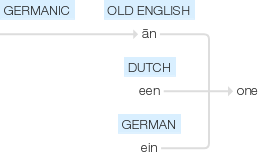One
Old English ān, of Germanic origin; related to Dutch een and German ein, from an Indo-European root shared by Latin unus . The initial w sound developed before the 15th century and was occasionally represented in the spelling; it was not accepted into standard English until the late 17th century.
wiktionary
From Middle English one, on, oan, an, from Old English ān(“one”), from Proto-West Germanic *ain, from Proto-Germanic *ainaz(“one”), from Proto-Indo-European *óynos(“single, one”). Cognate with Scots ae, ane, wan, yin(“one”); North Frisian ån(“one”); Saterland Frisian aan(“one”); West Frisian ien(“one”); Dutch een, één(“one”); German Low German een; German ein, eins(“one”); Swedish en(“one”); Norwegian Nynorsk ein(“one”), Icelandic einn(“one”); Latin ūnus(“one”) (Old Latin oinos); Russian оди́н(odín). Doublet of Uno.
Use as indefinite personal pronoun influenced by unrelated French on. [1]
Verb form from Middle English onen.
Around the 14th century, in southwest and western England, the word began to be pronounced with an initial /w/ [1] [2] (compare e.g. woak, Middle English wocke, a dialectal form of oak), [3] and the spellings won and wone began to be found alongside on, one; [4] the /w/ had become the norm by the 18th century. [1] In alone, atone, and only, [2] as well as in the dialectal form un, 'un [1] (and in none and no), [5] the older pronunciations without /w/ are preserved, [1] [2] while once shows the same /w/.
etymonline
one (adj., pron., n.)
"being but a single unit or individual; being a single person, thing, etc. of the class mentioned;" as a pronoun, "a single person or thing, an individual, somebody;" as a noun, "the first or lowest of the cardinal numerals; single in kind, the same; the first whole number, consisting of a single unit; unity; the symbol representing one or unity;" c. 1200, from Old English an (adjective, pronoun, noun) "one," from Proto-Germanic *ainaz (source also of Old Norse einn, Danish een, Old Frisian an, Dutch een, German ein, Gothic ains), from PIE root *oi-no- "one, unique."
Originally pronounced as it still is in only, atone, alone, and in dialectal good 'un, young 'un, etc.; the now-standard pronunciation "wun" began c. 14c. in southwest and west England (Tyndale, a Gloucester man, spells it won in his Bible translation), and it began to be general 18c. Its use as indefinite pronoun was influenced by unrelated French on and Latin homo.
Before the name of a person, indicating "hitherto unknown" or not known to the speaker.
One and only "sweetheart" is from 1906. Slang one-arm bandit for a type of slot machine is recorded by 1938. One-night stand is 1880 in performance sense; 1963 in sexual sense. One of the boys "ordinary amiable fellow" is from 1893. One-track mind "mind capable of only one line of thought or action" is by 1915. Drinking expression one for the road is from 1950 (as a song title). One-man band is by 1909 in a literal sense, 1914 figurative. One of those things "unpredictable occurrence" is from 1934.
The conscience clause is one of the weaknesses of the Bill. It is one of those things which tend to create the bitterness. The conscience clause is one of those things which are inseparable from a Bill like this. It is one of those things which divides the sheep from the goats—members can pick them out for themselves—in the playground, in the school. ["Religious Exercises in School Bills," New Zealand Parliamentary Debates, Aug. 13, 1926]
